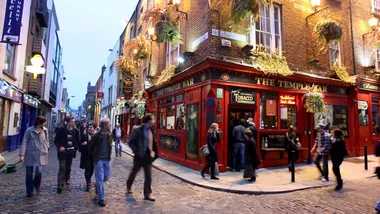Jerusalem is 45 minutes drive and 3000 years from Tel Aviv. In Tel Aviv, thousands of carefree Israelis dance till dawn in nightclubs overlooking the Mediterranean, arms in the air, the words to the songs falling easily from their pretty young lips: Sex, sex, sex on the beach …
In Jerusalem, there is no sex on any beach, only prayers, lamentations and messianic yearnings stretching back over the centuries, behind the medieval limestone walls and towers of this desert city.
To say that there is no place on earth like Jerusalem is to indulge in massive understatement. No place has been more revered and ravaged, more conquered and re-conquered, more subject to the competing claims of hostile faiths and creeds than this small city at the end of a corridor of pale, broken hills.
Jerusalem is where history piles in on geography, squeezing it for space and air to breathe. You name the army, you name the civilisation or empire, you name the religious or national grouping and they have all been here. They have all come to conquer and lay waste, and to lay claim to its holy treasures – Canaanites, Israelites, Moabites, Hittites, Nabatites, Byzantines, Greeks, Romans, Persians, Crusaders, Saracens, Turks, Ottomans, Egyptians, British, Jordanians, Israelis again …
Jerusalem is as much a sacred site as a place where people live and work and pray, a “psychic empire”, according to the Israeli writer, Amos Elon, that has seized – and kept hold of – the imagination of Jews, Christians and Muslims for two millennia.
This is Abraham’s city. This is King David and King Solomon’s city. This is the place of Christ’s passion, crucifixion and resurrection. This is the city of the Via Dolorosa and Mary’s Tomb and David’s citadel.
This is where Mohammed stopped on his night voyage to heaven because, as one Jerusalem professor quipped – obviously he was a Jew! – “there are no direct flights from Mecca to heaven. You have to make a stopover in Jerusalem”. This is the city that Nebuchadnezzar destroyed and that mad King Herod rebuilt. This is where Pontius Pilate condemned Jesus and where the Last Supper was held, and where a crown of thorns was placed on this all-loving Jewish sectarian’s head. This is where the Crusaders arrived, waist-deep in the blood of their enemies, Muslims and Jews alike, and from where Saladin eventually sent them packing in 1187 AD.
This is where Israel’s legendary one-eyed general, Moshe Dayan, arrived nearly 800 years later, through the same gate that Jesus first entered on a donkey – to reclaim the city for the Jewish people after nearly 2000 years of exile. What irony. What perverse symmetry. The Nazarene peacemaker and the Jewish general. The Christian saint and the Israeli soldier.
To understand the power that Jerusalem holds over the collective imagination you only need to visit and contemplate one small patch of this ancient, blood-soaked town. Then you will begin to appreciate why it is said that even the jackals cry their biblical injunctions at night.
The place is known as the Temple Mount and you can reach it from various directions, through the narrow, cobbled, spice-filled alleyways of the Old City. (On this visit, I came at it via the Via Dolorosa, from the Stations of the Cross, where Jesus was once flagellated and scourged, and sent mockingly on his way to Golgotha.)
The Temple Mount is where you feel history, religion, nationalism, politics, fanaticism and biblical prophecy all colliding as one, and where you fear that if ever there were to be another Middle Eastern conflagration, it would be over this hallowed, contested spot. In the flat-earth cosmology of the Middle Ages, this was the centre of the universe. It still might be.



